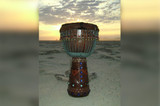Drums and Cold Weather
We are always warned against extreme temperatures, so when it comes to drums and cold weather, we might worry about how our equipment will hold up. We don’t want to experience shattered drum heads or separating pieces. So, what is the best way to care for our drums in the cold?
First of all, don’t worry. It is likely that cold weather will have little effect on higher quality drums. If you are worried about keeping your drums warm while storing them in below zero weather, you can always wrap them blankets. The key is to make sure you allow your drums time to warm up before playing. When transporting your drums for a show inside a building, for example, make sure you let them sit in the warmer environment for twenty minutes or longer prior to playing. It is unlikely that playing a cold set of drums will cause any physical damage, but you may notice a difference in sound quality.
Most modern drums are manufactured using components that will withstand cold weather. If you usually play your drums in a place where it is difficult to control the temperature (for instance, a garage), cold weather shouldn’t be a problem unless you are dealing with extreme cold. If you keep your drums in a place that experiences extreme cold temperatures, you might want to reconsider that decision. There is a big difference between 30°F (about -1°C) and -10°F (about -23°C). While your drum set may be built to hold up against colder temperatures, extreme cold is another matter altogether.
Ultimately, drums and cold weather are not as big a deal as drums and humidity. Your drum set will probably be fine either stored or played in cold weather. The potential problems you want to look out for are high humidity environments and extreme fluctuations in temperature. Both those issues can cause warping and cracking, as can extremely hot environments. But when it comes to drums and cold weather, there should not be cause for too much concern.
For the best sound quality, of course it is better to play your drums at room temperature. If you have no choice but to play your drums in a cold room, consider getting a space heater. This way you can add some warmth to the environment if you are dissatisfied with how your drumming sounds. Other than that, bundle up. The cold weather will probably affect you long before your drums show any negative effects.
Recent Posts
-
What is the Best Size Djembe for Beginners?
If you're new to the world of percussion and interested in learning the djembe, you're in for a t …16th Jul 2024 -
The Benefits of Becoming a Drumming Teacher: Transforming Passion into Profession
Why become a drumming teacher? Becoming a drumming teacher is an excellent way to share your pas …22nd May 2024 -
What Makes the Djembe Drum a Spiritual Instrument in African Music?
Origin and history of the Djembe drum The Djembe drum originates from West Africa and holds sign …16th May 2024




